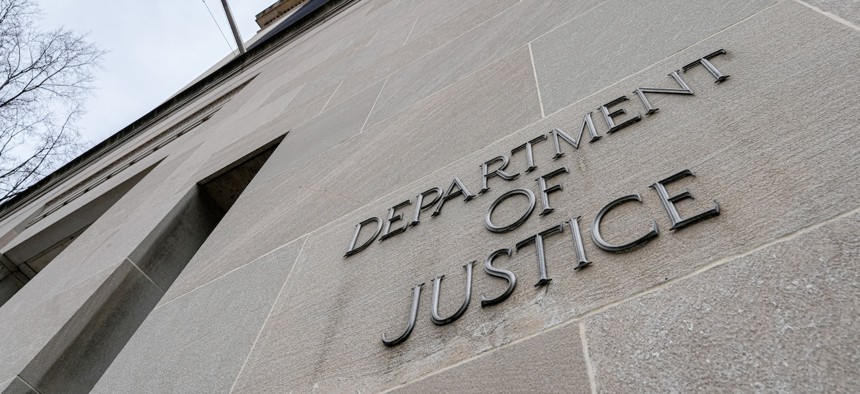
NAIJ and IFPTE have brought their concerns about the gag order to the White House. David Ake/Getty Images
DOJ issues 'gag order' on immigration judges
Biden administration says the union representing the judges can no longer speak publicly without agency sign off.
The Justice Department is warning one of its employee groups that it can no longer speak publicly without prior agency approval, raising concerns the Biden administration is placing a “gag order” on certain workers despite a promise to be their advocates.
The issue stems from the National Association of Immigration Judges losing its recognition as a union, leading Justice to tell the organization any rights it previously enjoyed as part of a collective bargaining agreement are no longer valid. NAIJ has represented immigration judges for more than 50 years and has never previously faced restrictions on its public testimony.
In an email last month to NAIJ leadership, Sheila McNulty, the chief immigration judge at Justice's Executive Office of Immigration Review said that while those officials may be “under the impression” in written and spoken engagements without agency authorization, that was not the case.
“The agency understands this is a point of contention for you, but any bargaining agreement related to that point that may have existed previously is not valid at present,” McNulty said. “Please consider this email formal notice that you are subject to the same policies as every EOIR employee.”
In November 2020, the Federal Labor Relations Authority voted to decertify NAIJ’s union status, asserting that the judges are now management officials. FLRA reaffirmed that decision in 2022, despite the Biden administration withdrawing its request for decertification. NAIJ appealed that decision to the U.S. Court of Appeals for the D.C. Circuit, but the court last year dismissed the case for lack of jurisdiction while the union was still seeking a remedy before the labor authority.
Matt Biggs, president of the International Federation of Professional and Technical Engineers, NAIJ’s parent union, speculated the directive came down now as a result of testimony NAIJ President Mimi Tsankov gave before the Senate last fall.
“It’s a pretty draconian directive,” said Biggs, who spoke on behalf of the NAIJ leaders who are no longer permitted to freely speak to the media. “It’s pretty unprecedented.”
NAIJ has occasionally used its platform to speak out against policy changes it views as harmful to the roles of immigration judges. The group has regularly made itself available to the media, testified before Congress and participated in panel discussions. It has frequently derided its placement within Justice—as Tsankov reiterated in her recent congressional testimony—saying it should instead be made an independent court under Article 1 of the Constitution. Political pressures and departmental mismanagement made possible under the current arrangement has contributed to the backlog of nearly 3 million cases, the union has said.
EOIR did not respond to a request for comment on the new policy.
Democrats and Republicans in Congress are in agreement the gag order is unwarranted, Biggs said, citing his conversations with lawmakers. He noted it is in direct opposition to the pledges made by President Biden and his administration to empower federal workers and their unions to engage in collective bargaining. Biden created a White House Task Force on Worker Organizing and Empowerment that helped identify ways to ease the process for federal employees to join unions.
NAIJ and IFPTE have brought their concerns about the gag order to the White House, Biggs said. The group is still hopeful it can regain its union certification once the Senate confirms the full slate of Biden’s FLRA nominees. There are currently around 700 immigration judges, a number Biden is looking to grow significantly.







